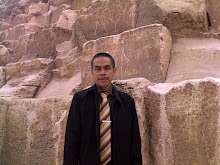THE SELF-RELIANCE OF PESANTREN
By Abd A’la
From 2002 to 2005, the US Foreign Office conducted an exchange program for leaders of pesantren (Indonesian-based Islam boarding school) from several regions of
At the initial stage of program, accusation were hurled that it was all a brain-washing program designed to change Islamic character of pesantren and to eventually mould them into US agents and supporters. They who accused also condemned those leaders –since acquiring knowledge from source –they deem “untrue and unauthentic”.
This judgmental response is essentially a challenge for pesantren to reinforce further their existence as critical and independent religious educational institutions. Indeed, pesantren that participated in this program were challenged to prove that the visits were purely based on the schools mission that is to introduce the values and teaching that conform to its moderate and transparent character. At the same time, the visit should be regarded as an integral part of pesantren traditions welcoming scientific development originating from whatever source, as long as it conforms to substantial Islamic values and teaching that are not based on the dichotomy, which assumes simply the West, is invariably bad, and the East (especially Islamic Middle East) is always good.
Confronted by this challenge, pesantren need to respond by looking back into their own history abundant with authentic values and traditions that so far provided them with a solid foundation in addressing social changes and development in human life. This retrospection reveals that one of pesantren characteristics is embedded in their independence or autonomy in developing educational institutions, and in conducting interactions with institutions outside the pesantren. It is through this independence that pesantren remain in existence and possess the opportunity to become an alternative educational institution.
The history has shown that because of their independence, the Indonesian Islamic boarding schools have always been capable of retaining their basic characteristics and innate nature but transforming in accordance with the context of the age. In the colonial period, pesantren transformed their independence into non-cooperation action against the colonizers. It underwent three different phases. First, the isolation phase it was when pesantren evacuated to rural and isolated areas in order to be out of reach from the colonial environment and atmosphere. Then they came the phase of silent and unobtrusive opposition through fostering and encouraging the spirit of resistance against the colonizers. Finally, it was the period of physical rebellion when pesantren collaborated in fighting and eventually evicting the colonizers from the home country together with communities and the founding fathers of the Indonesian nation.
When pesantren adopted the scholastic religious teaching system during the initial years of the country independence, they emphasis the meaning of independence placed on the autonomy to develop the school curricula. During the reign of the Soeharto, when the regime coerced pesantren to follow the uniform national education system, the institution still maintained their policy. Pesantren never lost the creativity to imbue significance into the values of their self-reliance as well as to contextualize them. With their creativity, pesantren were able to translate the forced national curricula into syllabi that continued to be combined with typical pesantren values and topics.
Such self-reliance enabled those Indonesian Islamic boarding schools to collaborate with the “outsider” without becoming subject to dominating influences, to safeguard the interests of their own Islamic mission in its widest meaning, and to develop a more substantial educational meaning and objective.
Within this perspective, a number of pesantren since mid of the 1970’s have carried out pioneering cooperation programs with non-governmental-organizations (NGOs) with objective to develop their mission in a more systematic, transformative, and emancipative manner, especially in empowering community. From this point, pesantren have customarily established critical working relations with other institutions, both at national and international level.
At the initial stage, insulting remark were addressed to pesantren considered to have abandoned their main mission as an Islamic institution, even accused of having imported non-Islamic missions from the outside. However, time has proved that none of the accusations has been validated. On the contrary, pesantren through community development program have successfully imbued with much more genuine meaning in the process of humanizing people as the Prophet and the Muslim generation did.
Those facts reveal that self-reliance has always been the major character accompanying pesantren activities most of all the time. It is such autonomy and influence-free from external interventions that –Abdurrahman Wahid stated –has afforded these Islamic institutions with ample space to develop necessary strategies by experimenting with ideas and concepts. In turn, this provides pesantren the flexibility to generate educational concepts that are new and fresh, playing culturally a complementary role in establishing a strong foundation for fundamental transformation, which the nation largely need.
In generally speaking, the open philosophy which pesantren adopted has never obliterated their autonomy. By means of their strong belief and noble traditions, pesantren keep on developing critical –and at the same time –“aggressive” relationships and communications with the governmental institutions and others, home and global. It is the fact ensuring pesantren to which the grasping influences of outside hegemony would never co-opt.
Based on the above-mentioned arguments, we should view the visit of a number of the pesantren leaders to US in the framework of the independence. As they stated, during their visit, they observed, discussed, and even criticized the
Their critical attitude certainly does not erase their wisdom and as such. They have not only been able to scrutinize the negative points, but also have been able to appreciate the positive sides found in the
Similarly, they have objectively observed the pluralism within the
The existing complicated reality they have viewed and discovered in the
It is the point they have had to take into consideration when, following their visit to the
Published on the Point,







No comments:
Post a Comment